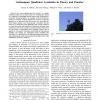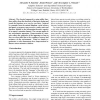276 search results - page 32 / 56 » A control theoretic approach to noncooperative game design |
TON
2002
13 years 7 months ago
2002
The notion of timeout (namely, the maximal time to wait before retrying an action) turns up in many networking contexts, such as packet transmission, connection establishment, etc....
CORR
2010
Springer
13 years 7 months ago
2010
Springer
In this paper, we address the problem of creating believable agents (virtual characters) in video games. We consider only one meaning of believability, "giving the feeling of...
NETGAMES
2003
ACM
14 years 25 days ago
2003
ACM
: This paper outlines the basic spatial principles of level design in multi-player first-person shooters with special reference to Counterstrike, basing itself on experiment, analy...
ICRA
2010
IEEE
13 years 6 months ago
2010
IEEE
— For many applications, the control of a complex nonlinear system can be made easier by modeling the system as a collection of simplified hybrid modes, each representing a part...
CEC
2005
IEEE
14 years 1 months ago
2005
IEEE
Abstract- The classical approach to using utility functions suffers from the drawback of having to design and tweak the functions on a case by case basis. Inspired by examples from...



